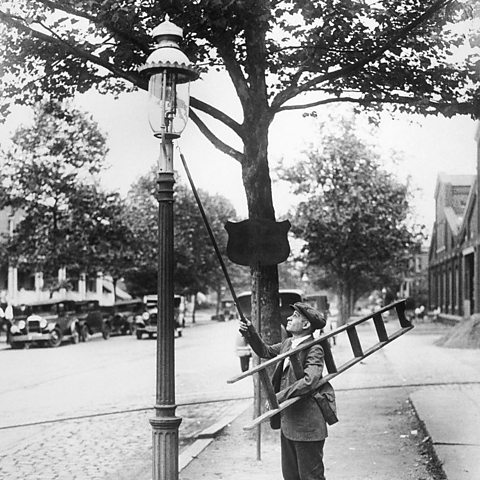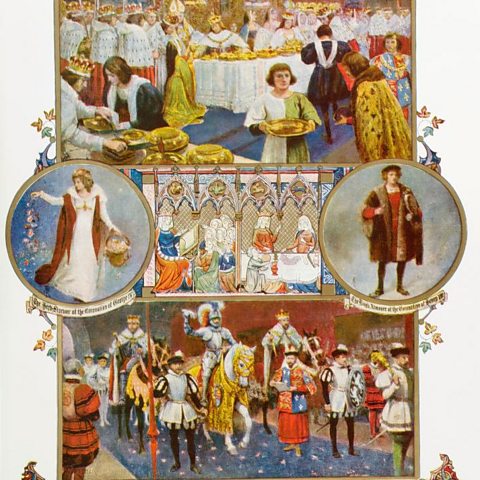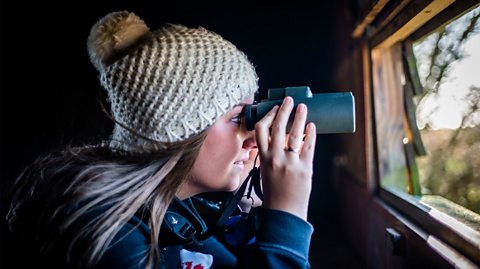As our world changes, some jobs become automated or disappear completely.
And they might not be shown at your careers fair anytime soon, but they do give us insight into a fascinating past. From picking up pins to shooting peas at windows, here are six long-lost jobs in history.
Lamplighter
Before the streets were illuminated with electricity, streetlamps operated on gas. They had to be lit by hand every night and extinguished every morning.
Lamplighters would use a long pole to ignite the lamps all over towns and cities, and then a āsnuffer-outerā would take over the shift at dawn to put them out. Sounds like a drag, but having the streets lit up at night drastically reduced crime and made them safer for travel.
The remaining gas lamps in Britain today are mostly in London, and are often lit for the sake of heritage. So, while it's not a career option anymore, lamplighting occasionally makes a comeback ā often around Christmas time.

Pure finder
Pure finding was a stinky job, but not one to be sniffed at.
Before there were reliable sewage systems in Victorian London, pure finders collected dog poo off the streets to sell to tanneries. The poo was used as a paint-drying agent for book bindings as well as to purify leather (hence āpureā finder) and make it softer and more flexible.
We now have chemicals to soften leather, so pure finding fizzled out as a career choice (except for pet owners, who get to do it for free!). Naturally this wasnāt the most hygienic profession and came with a lot of health risks. Perhaps itās best that we've bagged it and binned it.
Pin setter
Indoor bowling alleys have been around since 1840, and back then there were no fancy machines to retrieve your ball or reset the pins. Pin setters or āpin boysā were employees who stood at the end of each lane and put the pins back up after they were knocked down. They also had to roll the ball back up the gutter so you could have another go.
By the late 19th century, indoor bowling was immensely popular and New York City became a centre for it. Pin setting was a very important job, but paid little for long hours. Imagine standing just picking up pins long into the night - and taking cover if someone bowled the ball too hard.
By the 1950s, automatic pinsetters were mass produced, which made bowling more convenient. Manual pin setters may have been out of a job, but they were safe from bowling balls at lastā¦
Knocker-upper
Before alarm clocks were affordable and reliable, someone had to wake the townspeople up for work. Knocker-upper was a profession in Britain and Ireland which was still around during the industrial revolution. The job entailed walking around the town at dawn and tapping on peopleās windows with a baton or stick. The knocker-upper would do this according to the time people had specified on a slate outside their front door ā kind of like a personalised alarm service.
Knocker-uppers were generally elderly folk, but some police constables would earn extra pay by acting as a knocker-upper whilst on patrol. A known knocker-upper, Mary Smith, even used a rubber tube as a peashooter, bombarding windows with dried peas or tiny rocks. It would be considered a nuisance now, but knocker-uppers were once integral to the working populationās lives.
Leech collector
Leeches have been used in medicine for thousands of years, believed to āleechā out ailments from a patient by sucking their blood in a process known as ābloodlettingā. There was a significant bloodletting craze in Britain in the 1800s, and, as supply couldnāt meet demand, most leeches were imported from France.
However they had to be collected first. Those wriggly suckers were difficult to fish for, so there was a peculiar method to snag them. Leech collectors would wade out into a river or lake with their shins exposed and stand around until the leeches bit them. Then theyād come out and wait for the leeches to drop off, ready to be collected and put away for doctors.
Leeches could suck for twenty minutes before they were full, so fainting was an occupational hazard of this job. Collectors could also contract many terrible diseases from the leeches and the bites were susceptible to infection.
Did you know leeches are an approved medical device even today? Theyāre farmed rather than collected though, which sucks for the collectors but is probably better for their health.

Herb strewer
In the 1600s, things werenāt kept as clean as they are now. This meant that the streets and even peopleās homes were rife with terrible odours. Royal and upstanding households could employ a solution to this in the form of herb strewers.
Herb strewers wandered about their employerās homes or even in front of them as they walked, distributing pleasant-smelling herbs to mask those bad odours. This might sound more fun than picking up poo or collecting bloodsucking worms, but all of that strewing required sweeping up at the end of the day.
As sanitation improved, herb strewing became obsolete. But if youāre a dab hand at throwing bird-friendly, biodegradable confetti at weddings, then maybe itās the job for you!

Job inspiration: Careers in healthcare and frontline services. collection
Hear from people working across the healthcare sector and in frontline services, including some roles you may not know existed!

Job inspiration: Careers in media collection
Hear from young people about how they got started in their careers in media.

Job inspiration: Roles to help protect the planet. collection
Check out our collection of planet-friendly jobs to inspire your future career path.
